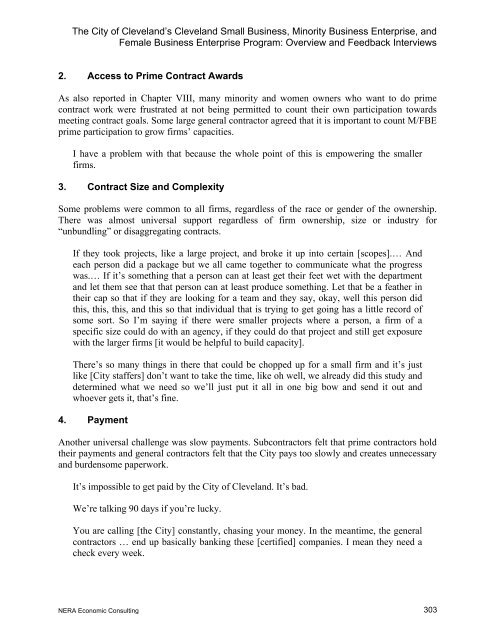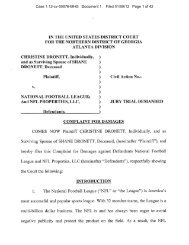- Page 1 and 2:
The State of Minority- and Women- O
- Page 3:
About the Project Team NERA Economi
- Page 6 and 7:
Notice This report sets forth the i
- Page 8 and 9:
Contents C. Race and Gender Dispari
- Page 10 and 11:
List of Tables Table 4.5. Services
- Page 12 and 13:
List of Tables Table 5.14. Disparit
- Page 14 and 15:
List of Tables Table 7.10. M/WBE Ut
- Page 16 and 17:
List of Tables Table 8.10. Percent
- Page 18 and 19:
List of Tables Table AC.32. Industr
- Page 20 and 21:
C. Defining the Relevant Markets Ex
- Page 22 and 23:
Table A. Overall Current Availabili
- Page 24 and 25:
Executive Summary disparity analysi
- Page 26 and 27:
Executive Summary • A greater sha
- Page 28 and 29:
Executive Summary Table C. Utilizat
- Page 30 and 31:
Contracting Category/ M/WBE Type Ex
- Page 32 and 33:
Executive Summary contract performa
- Page 34 and 35:
I. Introduction Introduction The Ci
- Page 36 and 37:
Legal Standards for Government Affi
- Page 38 and 39:
Legal Standards for Government Affi
- Page 40 and 41:
Legal Standards for Government Affi
- Page 42 and 43:
Legal Standards for Government Affi
- Page 44 and 45:
Legal Standards for Government Affi
- Page 46 and 47:
Legal Standards for Government Affi
- Page 48 and 49:
Legal Standards for Government Affi
- Page 50 and 51:
Legal Standards for Government Affi
- Page 52 and 53:
Legal Standards for Government Affi
- Page 54 and 55:
Legal Standards for Government Affi
- Page 56 and 57:
Legal Standards for Government Affi
- Page 58 and 59:
Legal Standards for Government Affi
- Page 60 and 61:
Legal Standards for Government Affi
- Page 62 and 63:
Legal Standards for Government Affi
- Page 64 and 65:
Legal Standards for Government Affi
- Page 66 and 67:
Legal Standards for Government Affi
- Page 68 and 69:
Legal Standards for Government Affi
- Page 70 and 71:
Legal Standards for Government Affi
- Page 72 and 73:
Legal Standards for Government Affi
- Page 74 and 75:
Legal Standards for Government Affi
- Page 76 and 77:
B. Preparing the Master Contract/Su
- Page 78 and 79:
Defining the Relevant Markets Table
- Page 80 and 81:
Defining the Relevant Markets Table
- Page 82 and 83:
Defining the Relevant Markets Table
- Page 84 and 85:
Defining the Relevant Markets Table
- Page 86 and 87:
Defining the Relevant Markets Table
- Page 88 and 89:
• Franklin County, OH (Columbus)
- Page 90 and 91:
NAICS Industry Group NAICS Descript
- Page 92 and 93:
Defining the Relevant Markets In AE
- Page 94 and 95:
NAICS Industry Group 8112 5412 5324
- Page 96 and 97:
NAICS Industry Group Source: See Ta
- Page 98 and 99:
NAICS Industry Group 4233 NAICS Des
- Page 100 and 101:
M/WBE Availability in the City of C
- Page 102 and 103:
M/WBE Availability in the City of C
- Page 104 and 105:
NAICS Industry Group M/WBE Availabi
- Page 106 and 107:
NAICS Industry Group M/WBE Availabi
- Page 108 and 109:
NAICS Industry Group M/WBE Availabi
- Page 110 and 111:
NAICS Industry Group M/WBE Availabi
- Page 112 and 113:
M/WBE Availability in the City of C
- Page 114 and 115:
NAICS Industry Group M/WBE Availabi
- Page 116 and 117:
NAICS Industry Group M/WBE Availabi
- Page 118 and 119:
M/WBE Availability in the City of C
- Page 120 and 121:
NAICS Industry Group M/WBE Availabi
- Page 122 and 123:
M/WBE Availability in the City of C
- Page 124 and 125:
M/WBE Availability in the City of C
- Page 126 and 127:
M/WBE Availability in the City of C
- Page 128 and 129:
M/WBE Availability in the City of C
- Page 130 and 131:
NAICS Industry Group M/WBE Availabi
- Page 132 and 133:
NAICS Industry Group M/WBE Availabi
- Page 134 and 135:
M/WBE Availability in the City of C
- Page 136 and 137:
NAICS Industry Group M/WBE Availabi
- Page 138 and 139:
NAICS Industry Group M/WBE Availabi
- Page 140 and 141:
M/WBE Availability in the City of C
- Page 142 and 143:
M/WBE Availability in the City of C
- Page 144 and 145:
M/WBE Availability in the City of C
- Page 146 and 147:
M/WBE Availability in the City of C
- Page 148 and 149:
M/WBE Availability in the City of C
- Page 150 and 151:
Detailed Industry Group Navigationa
- Page 152 and 153:
Table 4.24. Detailed M/WBE Availabi
- Page 154 and 155:
Detailed Industry Group M/WBE Avail
- Page 156 and 157:
Detailed Industry Group General Med
- Page 158 and 159:
Detailed Industry Group Machine Sho
- Page 160 and 161:
Detailed Industry Group Products Me
- Page 162 and 163:
Table 4.28. Detailed DBE Availabili
- Page 164 and 165:
Table 4.30. Detailed DBE Availabili
- Page 166 and 167:
Market-Based Disparities in Busines
- Page 168 and 169:
Market-Based Disparities in Busines
- Page 170 and 171:
Market-Based Disparities in Busines
- Page 172 and 173:
Market-Based Disparities in Busines
- Page 174 and 175:
Market-Based Disparities in Busines
- Page 176 and 177:
Market-Based Disparities in Busines
- Page 178 and 179:
Market-Based Disparities in Busines
- Page 180 and 181:
Market-Based Disparities in Busines
- Page 182 and 183:
Market-Based Disparities in Busines
- Page 184 and 185:
Market-Based Disparities in Busines
- Page 186 and 187:
Market-Based Disparities in Busines
- Page 188 and 189:
Market-Based Disparities in Busines
- Page 190 and 191:
Market-Based Disparities in Busines
- Page 192 and 193:
Market-Based Disparities in Busines
- Page 194 and 195:
Market-Based Disparities in Busines
- Page 196 and 197:
Market-Based Disparities in Busines
- Page 198 and 199:
Market-Based Disparities in Busines
- Page 200 and 201:
VI. Statistical Disparities in Capi
- Page 202 and 203:
B. Theoretical Framework and Review
- Page 204 and 205:
Statistical Disparities in Capital
- Page 206 and 207:
Statistical Disparities in Capital
- Page 208 and 209:
Statistical Disparities in Capital
- Page 210 and 211:
D. Qualitative Evidence Statistical
- Page 212 and 213:
Statistical Disparities in Capital
- Page 214 and 215:
Table 6.7. Types of Problems Facing
- Page 216 and 217:
Statistical Disparities in Capital
- Page 218 and 219:
Table 6.9. Determinants of Loan Den
- Page 220 and 221:
Statistical Disparities in Capital
- Page 222 and 223:
Table 6.10. Alternative Models of L
- Page 224 and 225:
Statistical Disparities in Capital
- Page 226 and 227:
Table 6.13. Models of Interest Rate
- Page 228 and 229:
Statistical Disparities in Capital
- Page 230 and 231:
Statistical Disparities in Capital
- Page 232 and 233:
1. Qualitative Evidence Statistical
- Page 234 and 235:
) Prejudice against women. c) Preju
- Page 236 and 237:
Table 6.19. Determinants of Loan De
- Page 238 and 239:
Statistical Disparities in Capital
- Page 240 and 241:
Table 6.21. Models of Interest Rate
- Page 242 and 243:
Statistical Disparities in Capital
- Page 244 and 245:
2. Differences in Loan Denial Rates
- Page 246 and 247:
Table 6.26. Determinants of Loan De
- Page 248 and 249:
Table 6.28. Models of Credit Card U
- Page 250 and 251:
Statistical Disparities in Capital
- Page 252 and 253:
Table 6.31. Determinants of Interes
- Page 254 and 255:
Statistical Disparities in Capital
- Page 256 and 257:
B. M/WBE Utilization M/WBE Utilizat
- Page 258 and 259:
M/WBE Utilization and Disparity in
- Page 260 and 261:
M/WBE Utilization and Disparity in
- Page 262 and 263:
M/WBE Utilization and Disparity in
- Page 264 and 265:
M/WBE Utilization and Disparity in
- Page 266 and 267:
M/WBE Utilization and Disparity in
- Page 268 and 269:
M/WBE Utilization and Disparity in
- Page 270 and 271: M/WBE Utilization and Disparity in
- Page 272 and 273: M/WBE Utilization and Disparity in
- Page 274 and 275: M/WBE Utilization and Disparity in
- Page 276 and 277: M/WBE Utilization and Disparity in
- Page 278 and 279: M/WBE Utilization and Disparity in
- Page 280 and 281: M/WBE Utilization and Disparity in
- Page 282 and 283: M/WBE Utilization and Disparity in
- Page 284 and 285: Anecdotal Evidence of Disparities i
- Page 286 and 287: Anecdotal Evidence of Disparities i
- Page 288 and 289: Anecdotal Evidence of Disparities i
- Page 290 and 291: Anecdotal Evidence of Disparities i
- Page 292 and 293: Anecdotal Evidence of Disparities i
- Page 294 and 295: Anecdotal Evidence of Disparities i
- Page 296 and 297: Anecdotal Evidence of Disparities i
- Page 298 and 299: Anecdotal Evidence of Disparities i
- Page 300 and 301: Anecdotal Evidence of Disparities i
- Page 302 and 303: Anecdotal Evidence of Disparities i
- Page 304 and 305: Anecdotal Evidence of Disparities i
- Page 306 and 307: Anecdotal Evidence of Disparities i
- Page 308 and 309: The City of Cleveland’s Cleveland
- Page 310 and 311: The City of Cleveland’s Cleveland
- Page 312 and 313: The City of Cleveland’s Cleveland
- Page 314 and 315: The City of Cleveland’s Cleveland
- Page 316 and 317: The City of Cleveland’s Cleveland
- Page 318 and 319: The City of Cleveland’s Cleveland
- Page 322 and 323: The City of Cleveland’s Cleveland
- Page 324 and 325: The City of Cleveland’s Cleveland
- Page 326 and 327: The City of Cleveland’s Cleveland
- Page 328 and 329: The City of Cleveland’s Cleveland
- Page 330 and 331: The City of Cleveland’s Cleveland
- Page 332 and 333: Blanchflower, D. G., P. Levine and
- Page 334 and 335: References Fairlie, R. W. (1999),
- Page 336 and 337: References Ladd, H. F. (1998), “E
- Page 338 and 339: References U.S. Census Bureau (2004
- Page 340 and 341: Appendix A. Glossary Demand-side: R
- Page 342 and 343: Appendix A. Glossary NSSBF or SSBF.
- Page 344 and 345: Appendix B. Master M/WBE Directory
- Page 346 and 347: Appendix B. Master M/WBE Directory
- Page 348 and 349: Appendix C. Detailed Utilization, A
- Page 350 and 351: Appendix C. Detailed Utilization, A
- Page 352 and 353: Appendix C. Detailed Utilization, A
- Page 354 and 355: Appendix C. Detailed Utilization, A
- Page 356 and 357: Appendix C. Detailed Utilization, A
- Page 358 and 359: Appendix C. Detailed Utilization, A
- Page 360 and 361: Appendix C. Detailed Utilization, A
- Page 362 and 363: Appendix C. Detailed Utilization, A
- Page 364 and 365: Appendix C. Detailed Utilization, A
- Page 366 and 367: Appendix C. Detailed Utilization, A
- Page 368 and 369: Appendix C. Detailed Utilization, A
- Page 370 and 371:
Appendix C. Detailed Utilization, A
- Page 372 and 373:
Appendix C. Detailed Utilization, A
- Page 374 and 375:
Appendix C. Detailed Utilization, A
- Page 376 and 377:
Appendix C. Detailed Utilization, A
- Page 378 and 379:
Appendix C. Detailed Utilization, A
- Page 380 and 381:
Appendix C. Detailed Utilization, A
- Page 382 and 383:
Appendix C. Detailed Utilization, A
- Page 384 and 385:
Appendix C. Detailed Utilization, A
- Page 386 and 387:
Appendix C. Detailed Utilization, A
- Page 388 and 389:
Appendix C. Detailed Utilization, A
- Page 390 and 391:
Appendix C. Detailed Utilization, A
- Page 392 and 393:
Appendix C. Detailed Utilization, A
- Page 394 and 395:
Appendix C. Detailed Utilization, A
- Page 396 and 397:
Appendix C. Detailed Utilization, A
- Page 398 and 399:
Appendix C. Detailed Utilization, A
- Page 400 and 401:
Appendix C. Detailed Utilization, A
- Page 402 and 403:
Appendix C. Detailed Utilization, A
- Page 404 and 405:
Appendix C. Detailed Utilization, A
- Page 406 and 407:
Appendix C. Detailed Utilization, A
- Page 408 and 409:
Appendix C. Detailed Utilization, A
- Page 410 and 411:
Appendix C. Detailed Utilization, A
- Page 412 and 413:
Appendix C. Detailed Utilization, A
- Page 414 and 415:
Appendix C. Detailed Utilization, A
- Page 416 and 417:
Appendix C. Detailed Utilization, A
- Page 418 and 419:
Appendix C. Detailed Utilization, A
- Page 420 and 421:
Appendix C. Detailed Utilization, A
- Page 422 and 423:
Appendix C. Detailed Utilization, A
- Page 424 and 425:
Appendix C. Detailed Utilization, A
- Page 426 and 427:
Appendix C. Detailed Utilization, A
- Page 428 and 429:
Appendix C. Detailed Utilization, A
- Page 430 and 431:
Appendix C. Detailed Utilization, A
- Page 432 and 433:
Appendix C. Detailed Utilization, A
- Page 434 and 435:
Appendix C. Detailed Utilization, A
- Page 436 and 437:
Appendix C. Detailed Utilization, A
- Page 438 and 439:
Appendix C. Detailed Utilization, A
- Page 440 and 441:
Appendix C. Detailed Utilization, A
- Page 442 and 443:
Appendix C. Detailed Utilization, A
- Page 444 and 445:
Appendix C. Detailed Utilization, A
- Page 446 and 447:
Appendix C. Detailed Utilization, A
- Page 448 and 449:
Appendix C. Detailed Utilization, A
- Page 450 and 451:
Appendix C. Detailed Utilization, A
- Page 452 and 453:
Appendix C. Detailed Utilization, A
- Page 454 and 455:
Appendix C. Detailed Utilization, A
- Page 456 and 457:
Appendix C. Detailed Utilization, A
- Page 458 and 459:
Appendix C. Detailed Utilization, A
- Page 460 and 461:
Appendix C. Detailed Utilization, A
- Page 462 and 463:
Appendix C. Detailed Utilization, A
- Page 464 and 465:
Appendix C. Detailed Utilization, A
- Page 466 and 467:
Appendix C. Detailed Utilization, A
- Page 468 and 469:
Appendix C. Detailed Utilization, A
- Page 470 and 471:
Appendix C. Detailed Utilization, A
- Page 472 and 473:
Appendix C. Detailed Utilization, A
- Page 474 and 475:
Appendix C. Detailed Utilization, A
- Page 476 and 477:
Appendix C. Detailed Utilization, A
- Page 478 and 479:
Appendix C. Detailed Utilization, A
- Page 480 and 481:
Appendix C. Detailed Utilization, A
- Page 482 and 483:
Appendix C. Detailed Utilization, A
- Page 484 and 485:
Appendix C. Detailed Utilization, A
- Page 486 and 487:
Appendix C. Detailed Utilization, A
- Page 488 and 489:
Appendix C. Detailed Utilization, A
- Page 490 and 491:
Appendix C. Detailed Utilization, A
- Page 492 and 493:
Appendix C. Detailed Utilization, A
- Page 494 and 495:
Appendix C. Detailed Utilization, A
- Page 496 and 497:
Appendix C. Detailed Utilization, A
- Page 498 and 499:
Appendix C. Detailed Utilization, A
- Page 500 and 501:
Appendix C. Detailed Utilization, A
- Page 502 and 503:
Appendix C. Detailed Utilization, A
- Page 504 and 505:
Appendix C. Detailed Utilization, A
- Page 506 and 507:
Appendix C. Detailed Utilization, A
- Page 508 and 509:
Appendix C. Detailed Utilization, A
- Page 510 and 511:
Appendix C. Detailed Utilization, A
- Page 512 and 513:
Appendix C. Detailed Utilization, A
- Page 514 and 515:
Appendix C. Detailed Utilization, A
- Page 516 and 517:
Appendix C. Detailed Utilization, A
- Page 518 and 519:
Appendix C. Detailed Utilization, A
- Page 520 and 521:
Appendix C. Detailed Utilization, A
- Page 522 and 523:
Appendix C. Detailed Utilization, A
- Page 524 and 525:
Appendix C. Detailed Utilization, A
- Page 526 and 527:
Appendix C. Detailed Utilization, A
- Page 528 and 529:
Appendix C. Detailed Utilization, A
- Page 530 and 531:
Appendix C. Detailed Utilization, A
- Page 532 and 533:
Appendix C. Detailed Utilization, A
- Page 534 and 535:
Appendix C. Detailed Utilization, A
- Page 536 and 537:
Appendix C. Detailed Utilization, A
- Page 538 and 539:
Appendix C. Detailed Utilization, A
- Page 540 and 541:
Appendix C. Detailed Utilization, A
- Page 542 and 543:
Appendix C. Detailed Utilization, A
- Page 544 and 545:
Appendix C. Detailed Utilization, A
- Page 546 and 547:
Appendix C. Detailed Utilization, A
- Page 548 and 549:
Appendix C. Detailed Utilization, A
- Page 550 and 551:
Appendix C. Detailed Utilization, A
- Page 552 and 553:
Appendix C. Detailed Utilization, A
- Page 554 and 555:
Appendix C. Detailed Utilization, A
- Page 556 and 557:
Appendix C. Detailed Utilization, A
- Page 558 and 559:
Appendix C. Detailed Utilization, A
- Page 560 and 561:
Appendix C. Detailed Utilization, A
- Page 562 and 563:
Appendix C. Detailed Utilization, A
- Page 564 and 565:
Appendix C. Detailed Utilization, A
- Page 566 and 567:
Appendix C. Detailed Utilization, A
- Page 568 and 569:
Appendix C. Detailed Utilization, A
- Page 570 and 571:
Appendix C. Detailed Utilization, A
- Page 572 and 573:
Appendix C. Detailed Utilization, A
- Page 574 and 575:
Appendix C. Detailed Utilization, A
- Page 576 and 577:
Appendix C. Detailed Utilization, A
- Page 578 and 579:
Appendix C. Detailed Utilization, A
- Page 580 and 581:
Appendix C. Detailed Utilization, A
- Page 582 and 583:
Appendix C. Detailed Utilization, A
- Page 584 and 585:
Appendix C. Detailed Utilization, A
- Page 586 and 587:
Appendix C. Detailed Utilization, A
- Page 588 and 589:
Appendix C. Detailed Utilization, A
- Page 590 and 591:
Appendix C. Detailed Utilization, A
- Page 592 and 593:
Appendix C. Detailed Utilization, A
- Page 594 and 595:
Appendix C. Detailed Utilization, A
- Page 596 and 597:
Appendix C. Detailed Utilization, A
- Page 598 and 599:
Appendix C. Detailed Utilization, A
- Page 600 and 601:
Appendix C. Detailed Utilization, A
- Page 602 and 603:
Appendix C. Detailed Utilization, A
- Page 604 and 605:
Appendix C. Detailed Utilization, A
- Page 606 and 607:
Appendix C. Detailed Utilization, A
- Page 608 and 609:
Appendix C. Detailed Utilization, A
- Page 610 and 611:
Appendix C. Detailed Utilization, A
- Page 612 and 613:
Appendix C. Detailed Utilization, A
- Page 614 and 615:
Appendix C. Detailed Utilization, A
- Page 616 and 617:
Appendix C. Detailed Utilization, A
- Page 618 and 619:
Appendix C. Detailed Utilization, A
- Page 620 and 621:
Appendix C. Detailed Utilization, A
- Page 622 and 623:
Appendix C. Detailed Utilization, A
- Page 624 and 625:
Appendix C. Detailed Utilization, A
- Page 626 and 627:
Appendix C. Detailed Utilization, A
- Page 628 and 629:
Appendix C. Detailed Utilization, A
- Page 630 and 631:
Appendix C. Detailed Utilization, A
- Page 632 and 633:
Appendix C. Detailed Utilization, A
- Page 634 and 635:
Appendix C. Detailed Utilization, A
- Page 636 and 637:
Appendix C. Detailed Utilization, A
- Page 638 and 639:
Appendix C. Detailed Utilization, A
- Page 640 and 641:
Appendix C. Detailed Utilization, A
- Page 642 and 643:
Appendix C. Detailed Utilization, A
- Page 644 and 645:
Appendix C. Detailed Utilization, A
- Page 646 and 647:
Appendix C. Detailed Utilization, A
- Page 648 and 649:
Appendix C. Detailed Utilization, A
- Page 650 and 651:
Appendix C. Detailed Utilization, A
- Page 652 and 653:
Appendix C. Detailed Utilization, A
- Page 654 and 655:
Appendix C. Detailed Utilization, A
- Page 656 and 657:
Appendix C. Detailed Utilization, A
- Page 658 and 659:
Appendix C. Detailed Utilization, A
- Page 660 and 661:
Appendix C. Detailed Utilization, A
- Page 662 and 663:
Appendix C. Detailed Utilization, A
- Page 664 and 665:
Appendix C. Detailed Utilization, A
- Page 666 and 667:
Appendix C. Detailed Utilization, A
- Page 668 and 669:
Appendix C. Detailed Utilization, A
- Page 670 and 671:
Appendix C. Detailed Utilization, A
- Page 672 and 673:
Appendix C. Detailed Utilization, A
- Page 674 and 675:
Appendix C. Detailed Utilization, A
- Page 676 and 677:
Appendix C. Detailed Utilization, A
- Page 678 and 679:
Appendix C. Detailed Utilization, A
- Page 680 and 681:
Appendix C. Detailed Utilization, A
- Page 682 and 683:
Appendix C. Detailed Utilization, A
- Page 684 and 685:
Appendix C. Detailed Utilization, A
- Page 686 and 687:
Appendix C. Detailed Utilization, A
- Page 688 and 689:
Appendix C. Detailed Utilization, A
- Page 690 and 691:
Appendix C. Detailed Utilization, A
- Page 692 and 693:
Appendix C. Detailed Utilization, A
- Page 694 and 695:
Appendix C. Detailed Utilization, A
- Page 696 and 697:
Appendix C. Detailed Utilization, A
- Page 698 and 699:
Appendix C. Detailed Utilization, A
- Page 700 and 701:
Appendix C. Detailed Utilization, A
- Page 702 and 703:
Appendix C. Detailed Utilization, A
- Page 704 and 705:
Appendix C. Detailed Utilization, A
- Page 706 and 707:
Appendix C. Detailed Utilization, A
- Page 708:
NERA Economic Consulting Barton Cre
















